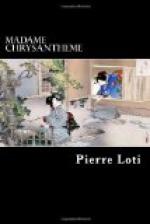Meantime, we, with the aid of a sort of secret key, open the door of our garden, where Madame Prune’s pots of flowers, ranged in the darkness, send forth delicious odors in the night air. We cross the garden by moonlight or starlight, and mount to our own rooms.
If it is very late,—a frequent occurrence,—we find all our wooden panels drawn and tightly shut by the careful M. Sucre (as a precaution against thieves), and our apartment is as close and as private as if it were a real European one.
In this house, when every chink is thus closed, a strange odor mingles with the musk and the lotus,—an odor essential to Japan, to the yellow race, belonging to the soil or emanating from the venerable woodwork; almost an odor of wild beast. The mosquito curtain of dark blue gauze ready hung for the night, falls from the ceiling with the air of a mysterious velum. The gilded Buddha smiles eternally at the night-lamps burning before him; some great moth, a constant frequenter of the house, which during the day sleeps clinging to our ceiling, flutters at this hour under the very nose of the god, turning and flitting round the thin quivering flames. And, motionless on the wall, its feelers spread out starwise, sleeps some great garden spider, which one must not kill because it is night. “Hou!” says Chrysantheme indignantly, pointing it out to me with leveled finger. “Quick! where is the fan kept for the purpose, wherewith to hunt it out of doors?”
Around us reigns a silence which is almost painful after all the joyous noises of the town, and all the laughter, now hushed, of our band of mousmes,—a silence of the country, of some sleeping village.
XXVI.
The noise of the innumerable wooden panels which at the fall of night are pulled and shut in every Japanese house, is one of the peculiarities of the country which will remain longest imprinted on my memory. From our neighbors’ houses, floating to us over the green gardens, these noises reach us one after the other, in series, more or less deadened, more or less distant.
Just below us, those of Madame Prune move very badly, creak and make a hideous noise in their worn-out grooves.
Ours are somewhat noisy too, for the old house is full of echoes, and there are at least twenty to run over long slides in order to close in completely the kind of open hall in which we live. Generally it is Chrysantheme who undertakes this piece of household work, and a great deal of trouble it gives her, for she often pinches her fingers in the singular awkwardness of her too tiny hands, which have never been accustomed to do any work.
Then comes her toilette for the night. With a certain grace she lets fall the day-dress, and slips on a more simple one of blue cotton, which has the same pagoda sleeves, the same shape all but the train, and which she fastens round her waist by a sash of muslin of the same color.




